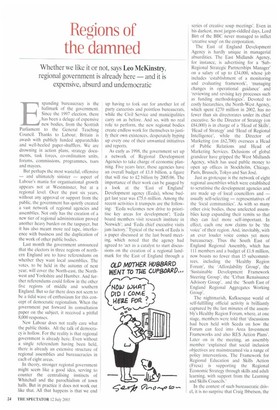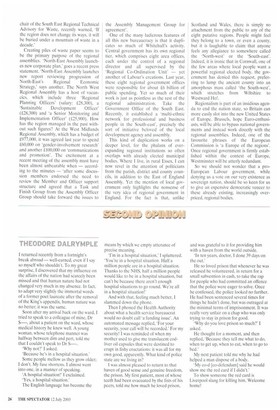Regions of the damned
Whether we like it or not, says Leo McKinstry, regional government is already here — and it is expensive, absurd and undemocratic
Expanding bureaucracy is the hallmark of the government. Since the 1997 election, there has been a deluge of expensive new bodies, from the Scottish Parliament to the General Teaching Council. Thanks to Labour, Britain is awash with publicly funded apparatchiks and well-heeled paper-shufflers. We are drowning in action plans, strategy documents, task forces, co-ordination units, forums, commissions, programmes, tsars and mayors.
But perhaps the most wasteful. offensive — and ultimately sinister — aspect of Labour's mania for organisational growth appears not at Westminster, but at a regional level. Over the past six years, without any approval or support from the public, the government has quietly created a vast network of regional agencies and assemblies. Not only has the creation of a new tier of regional administration proved another heavy burden on the taxpayer, but it has also meant more red tape, interference with business and the duplication of the work of other public bodies.
Last month the government announced that the electors in three regions of northern England are to have referendums on whether they want local assemblies. The votes, to be held in the autumn of next year, will cover the North-east, the Northwest and Yorkshire and Humber. And further referendums could follow in the other five regions of middle and southern England. But so far there does not seem to be a tidal wave of enthusiasm for this concept of democratic regionalism. When the government put forward its consultation paper on the subject, it received a pitiful 8,000 responses.
New Labour does not really care what the public thinks. All the talk of democracy is hollow. For the reality is that regional government is already here. Even without a single referendum having been held. there is already an extensive structure of regional assemblies and bureaucracies in each of eight areas.
In theory, stronger regional government might seem like a good idea, serving to counter the centralising instincts of Whitehall and the parochialism of town halls. But in practice it does not work out like that. All that happens is that we end up having to fork out for another lot of party careerists and pointless bureaucrats, while the Civil Service and municipalities carry on as before. And so, with no real role to perform, the new regional bodies create endless work for themselves to justify their own existences, desperately hyping up every one of their unwanted initiatives and reports.
As early as 1998. the government set up a network of Regional Development Agencies to take charge of economic planning. Five years later, these agencies have an overall budget of £1.8 billion, a figure that will rise to £2 billion by 2005/06. The importance of their work can be gauged by a look at the `East of England' Development agency (Eeda), whose budget last year was £75.6 million. Among the recent activities it trumpets are the following: Teda welcomes new drive to prioritise key areas for development'; `Eeda board members visit research institute in Norwich'; and 'Eeda chief executive visits jam factory.' Typical of the work of Eeda is a paper discussed at the last board meeting, which noted that the agency had agreed to 'act as a catalyst to start discussions on the creation of a regional landmark for the East of England through a series of creative soup meetings'. Even in his darkest, most jargon-riddled days, Lord Birt of the BBC never managed to inflict 'creative soup' on the corporation.
The East of England Development Agency is hardly unique in managerial absurdities. The East Midlands Agency, for instance, is advertising for a 'SubRegional Strategic Partnerships Manager' on a salary of up to £34,000, whose job includes `establishment of a monitoring and evaluating framework', `managing changes in operational guidance' and 'reviewing and revising key processes such as funding methodologies'. Devoted to costly hierarchies, the North-West Agency, which spent £270 million in 2002, has no fewer than six directorates under its chief executive. So the Director of Strategy (on £84,000) is in charge of a 'Head of Skills', `Head of Strategy' and `Head of Regional Intelligence', while the Director of Marketing (on £62,700) oversees a Head of Public Relations and Head of Marketing Services. Delusions of global grandeur have gripped the West Midlands Agency, which has used public money to open up offices in Stockholm, Chicago, Paris, Brussels, Tokyo and San Jose.
Just as grotesque is the network of eight regional assemblies which were established to scrutinise the development agencies and are made up of local councillors and — usually self-selecting — representatives of the `local communities'. As with so many other civic bodies, these unelected assemblies keep expanding their remits so that they can feel more self-important. In effect, each one now claims to be 'the voice' of their region. And, inevitably, with an ever louder voice comes yet more bureaucracy. Thus the South East of England Regional Assembly, which has 111 members and a budget of £1.8 million, now boasts no fewer than 15 subcommittees, including the `Healthy Region Forum', the 'Affordability Group', the 'Sustainable Development Framework Steering Group', the 'Urban Renaissance Advisory Group', and the 'South East of England Regional Aggregates Working Group'.
The nightmarish, Kafkaesque world of self-fulfilling official activity is brilliantly captured by the last minutes of the assembly's Healthy Region Forum, where, at one stage, members were told that `discussions had been held with Seeda on how the Forum can feed into Area Investment Frameworks and also RES Action Plans'. Later on in the meeting, an assembly member 'explained that social inclusion objectives are mainstreamed via a range of policy interventions. The Framework for Regional Education and Skills Action (Fresa) is supporting the Regional Economic Strategy through skills and adult learning, with support from the Learning and Skills Councils.'
In the context of such bureaucratic drivel, it is no surprise that Craig Ibbetson, the chair of the South East Regional Technical Advisory for Waste, recently warned, 'If the region does not change its ways, it will be buried under a mountain of waste in a decade.'
Creating piles of waste paper seems to be the primary purpose of the regional assemblies. 'North-East Assembly launches new corporate plan, goes a recent press statement. North-East Assembly launches new report reviewing progression of North-East's Regional Economic Strategy,' says another. The North West Regional Assembly has a host of vacancies, which include three 'Regional Planning Officers' (salary: £28,300), a 'Sustainable Development Officer' (28,300) and 'a Senior Monitoring and Implementation Officer' (£25,900). How has the region managed in the past without such figures? At the West Midlands Regional Assembly. which has a budget of £977,000, it was agreed last year to spend £60,000 on `gender-involvement research' and another £100,000 on 'communications and promotion'. The excitement at a recent meeting of the assembly must have been almost unbearable when — according to the minutes — 'after some discussion members endorsed the need to review the Member and Officer support structure and agreed that a Task and Finish Group from the Assembly Officer Group should take forward the issues to the Assembly Management Group for agreement'.
One of the many ludicrous features of all this new bureaucracy is that it duplicates so much of Whitehall's activity. Central government has its own regional tier, which comprises eight area offices, each under the control of a regional director and all supervised by the 'Regional Co-Ordination Unit' — yet another of Labour's creations. Last year, these eight regional government offices were responsible for about £6 billion of public spending. Yet so much of their work is just as pointless as the rest of the regional administration. Take the Government Office of the South East. Recently, it established a 'multi-ethnic network for professional and business people in the South-east', precisely the sort of initiative beloved of the local development agency and assembly.
This kind of duplication works on a deeper level, for the phalanx of everexpanding regional institutions so often overlaps with already elected municipal bodies. Where I live, in rural Essex, I can now revel in the attention of politicians from the parish, district and county councils, in addition to the East of England Assembly. Yet the mention of local government only highlights the nonsense of the very idea of regional government in England. For the fact is that, unlike Scotland and Wales, there is simply no attachment from the public to any of the eight putative regions. People might feel they belong to a town, or even a county, but it is laughable to claim that anyone feels any allegiance to somewhere called the 'North-west' or the 'South-east'. Indeed, it is ironic that in Cornwall, one of the few areas where local people want a powerful regional elected body, the government has denied this request, preferring to lump the ancient county into an amorphous mass called 'the South-west', which stretches from Wiltshire to Westward Ho!.
Regionalism is part of an insidious agenda to end the nation state, so Britain can more easily slot into the new United States of Europe. Brussels, hope Euro-enthusiasts, will be able to bypass national governments and instead work directly with the regional assemblies. Indeed, one of the favourite phrases of the European Commission is 'a Europe of the regions'. Once regional government is firmly established within the context of Europe, Westminster will be utterly redundant.
So we should not wonder that a proEuropean Labour government, while denying us a vote on our very existence as sovereign nation, should be so keen for us to give an expensive democratic veneer to these already existing, increasingly overpriced, regional bodies.



































































 Previous page
Previous page